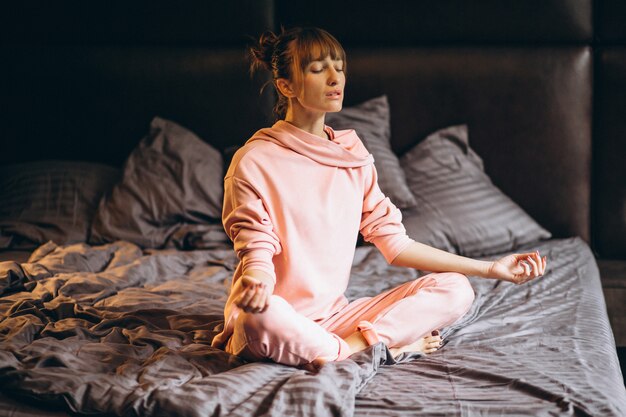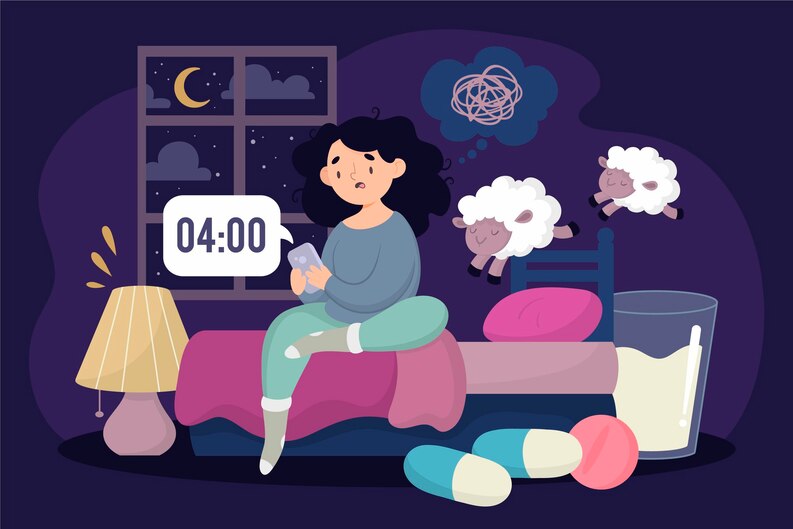And after a busy and tiring day, sleep is the best thing we live in a day!
We see sleep as an effortless thing; just fall on your bed, and you are all set to land into your dreams! Yes, it is true but in childhood only! As we age, we become sleepless!
Be it our daunting professional life, bad lifestyle, junk food , relationship cluster, or anything that keeps our mind working.
You wake up in the morning feeling groggy, and you can’t seem to get enough sleep at night. You’re constantly dragging yourself through the day, and you just can’t seem to function at your best.
If this sounds like you, then you need to check out this blog post!
Why Sleep is Crucial
Sleepless nights can turn into serious concerns, affecting our physical and mental well-being. But why is sleep so crucial in the first place? Let’s find all in this friendly talk!
Sleep is a fundamental biological process that allows our bodies and minds to rejuvenate and recover. During sleep, our bodies undergo various restorative processes, such as tissue repair, immune system strengthening, and memory consolidation. Moreover, sleep plays a vital role in regulating hormones, which impact our mood, stress levels, and overall cognitive function.
Benefits of Sound Sleep
A consistent and healthy sleep cycle comes with numerous benefits. These include improved concentration, enhanced creativity, better decision-making, and a strengthened immune system. Additionally, proper sleep has been linked to a reduced risk of chronic conditions such as obesity, diabetes, and cardiovascular diseases.
Possible Reasons for Sleepless Nights
Several factors can disrupt our sleep cycles. Stress, anxiety, excessive screen time, irregular daily routines, and poor sleep hygiene are common culprits. Additionally, certain medical conditions and medications can also interfere with our ability to achieve restful sleep.
Things You Can Do to Fix the Sleep Cycle
- Set a Consistent Schedule: Try to get up and go to bed at the same times every day, including on the weekends. This aids in regulating the biological clock in your body.
- Create a Relaxing Bedtime Routine: Establish a peaceful bedtime routine by doing things like reading, having a warm bath, or practicing deep breathing techniques before going to bed.
- Limit Screen Time: The blue light emitted by phones, tablets, and computers can disrupt your sleep. Avoid screens at least an hour before bedtime.
- Create a Comfortable Sleep Environment: Make sure your bedroom is conducive to sleep – it should be dark, quiet, and at a comfortable temperature.
- Watch Your Diet: Never have sweet things for dinner, say bie bie to junk meals, caffeine-rich drinks, likewise alcohol, as they can interfere with sleep.
- Get Regular Exercise: Engaging in regular physical activity can help improve sleep quality. However, avoid vigorous exercise close to bedtime.

Home Remedies for Better Sleep
- Herbal Teas: Chamomile, valerian root, and lavender teas are known for their calming effects and can promote better sleep.
- Aromatherapy: Essential oils like lavender or bergamot, used in a diffuser or added to a warm bath, can create a soothing atmosphere.
- Relaxation Techniques: Practices like meditation, progressive muscle relaxation, and yoga can help ease stress and promote relaxation before bedtime.
Bed Yoga and Sleep Supplements: A Holistic Approach to Restful Nights
If you are tired of all the methods, fret not! There is something you can give a try – bed yoga and organic sleep supplements. These practices offer distinct yet complementary methods to enhance sleep quality, providing a holistic solution for those seeking restful nights.
Bed Yoga for Relaxation
Bed yoga involves gentle stretches and calming poses that can be done right before sleep. This practice aims to relax both the body and mind, helping to release tension and promote a sense of tranquility conducive to sleep.

Poses to Consider:
- Child’s Pose: Kneel on the bed, lower your hips to your heels, and reach your arms forward. This gentle stretch elongates the spine and soothes the mind.
- Supine Twist: Lie on your back, bend one knee, and let it fall across your body while keeping your opposite arm extended. This twist relaxes the spine and aids in digestion, helping you unwind.
- Legs Up the Wall: Lie on your back and rest your legs vertically against the wall. This pose encourages blood circulation, reduces swelling in the legs, and promotes relaxation.
- Corpse Pose: Lie flat on your back, arms at your sides, and legs extended. Focus on deep, rhythmic breathing to release any remaining tension.
Sleep Supplements for Support
Sleep supplements are designed to complement healthy sleep habits and address any deficiencies or imbalances that might hinder restorative sleep. They can be especially helpful for individuals with sleep disorders or those experiencing high levels of stress.
Common Sleep Supplements
- Melatonin: A hormone that regulates the sleep-wake cycle. Taking melatonin as a supplement can help reset the body’s internal clock, particularly for those with irregular sleep patterns.
- Magnesium: Known for its relaxing properties, magnesium supplements can help calm the nervous system and promote better sleep.
- L-Theanine: Found in tea leaves, L-Theanine is an amino acid that promotes relaxation without causing drowsiness. It can help reduce anxiety and improve sleep quality.
- Valerian Root: This herbal supplement has been used for centuries to alleviate insomnia and promote relaxation.
The combination of bed yoga and sleep supplements offers a multi-faceted approach to achieving a more peaceful night’s sleep. By embracing these practices, individuals can create a bedtime routine that addresses both physical and internal factors, ultimately leading to improved sleep quality and overall well-being.
Final Words
Prioritizing a healthy sleep cycle is essential for overall well-being. By understanding the importance of sleep, identifying potential disruptors, and adopting healthy sleep habits, you can take significant steps towards achieving a restful and rejuvenating night’s sleep. Remember, small changes in your daily routine can substantially improve your sleep quality and overall quality of life.







Leave a Reply